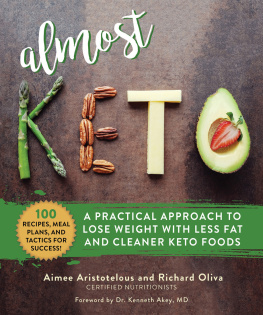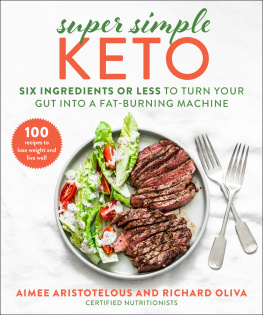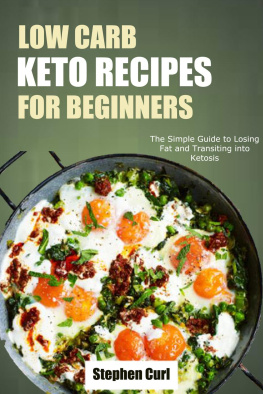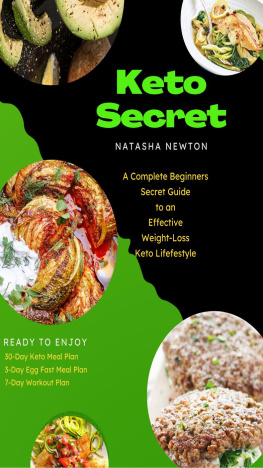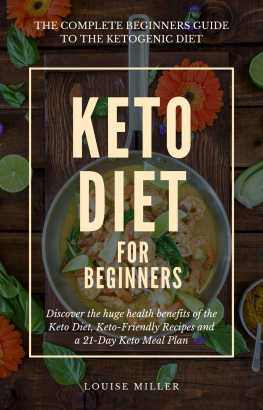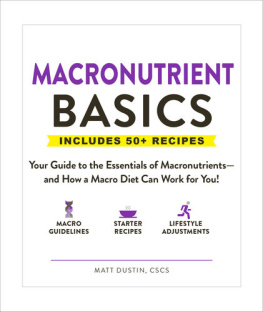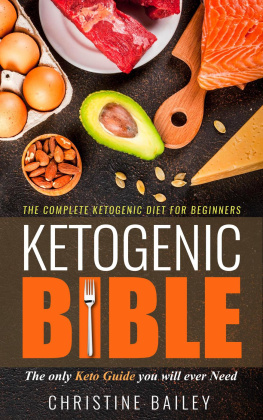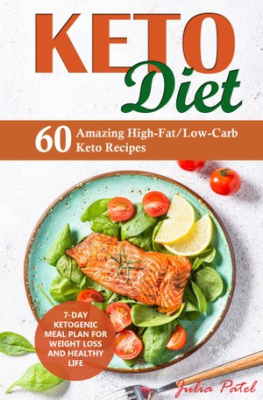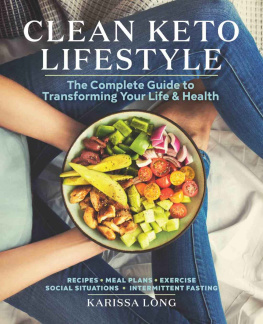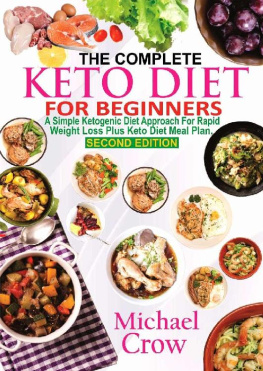


Copyright 2020 by Aimee Aristotelous and Richard Oliva
All rights reserved. No part of this book may be reproduced in any manner without the express written consent of the publisher, except in the case of brief excerpts in critical reviews or articles. All inquiries should be addressed to Skyhorse Publishing, 307 West 36th Street, 11th Floor, New York, NY 10018.
Skyhorse Publishing books may be purchased in bulk at special discounts for sales promotion, corporate gifts, fund-raising, or educational purposes. Special editions can also be created to specifications. For details, contact the Special Sales Department, Skyhorse Publishing, 307 West 36th Street, 11th Floor, New York, NY 10018 or .
Skyhorse and Skyhorse Publishing are registered trademarks of Skyhorse Publishing, Inc., a Delaware corporation.
Visit our website at www.skyhorsepublishing.com.
10 9 8 7 6 5 4 3 2 1
Library of Congress Cataloging-in-Publication Data is available on file.
Photography by Marcel Boldu, and Hair and Makeup by Deisy Da Silva:
.
Cover design by Daniel Brount
Cover photo by gettyimages
Print ISBN: 978-1-5107-5006-7
Ebook ISBN: 978-1-5107-5009-8
Printed in China
To our parents, Steve, Norma, Richard, and Dorothy, who taught us the importance of eating our vegetables, as well as a variety of other healthy foods. And to our son, Alex, who reminds us every day how important it is to share our love of real food and good nutrition.
Contents

Foreword
By Dr. Kenneth Akey
N utrition information is more readily available today than ever before in our history. While this is a good thing, it also can be very confusing to sort through all the advice on how to eat healthy. Should we follow the USDA MyPlate recommendations and eat whole grains, low-fat dairy, and limit added sugars to fifty to seventy-five grams per day? Should we adopt the Paleo diet and eat no grains, no dairy products, and no added sugars? Or should we choose the ketogenic diet and eat mostly fats, including whole-fat dairy, but no grains or added sugars? With all this conflicting advice, how are we to decide what is the best choice when it comes to our health?
In recent years, the ketogenic (keto) diet has helped many people lose weight and improve overall health. The documented, short-term benefits of the ketogenic diet include a variety of positive health outcomes in addition to weight loss, including reduced blood sugar, triglycerides, and LDL (bad) cholesterol and increased HDL (good) cholesterol. Animal studies have also suggested that the diet may have antiaging, anti-inflammatory, and cancer-fighting benefits. When considering the keto protocol, it is important to note that not all fats are created equal. For the best health outcomes, it is essential to select high-quality fats found in whole foods such as avocado, extra-virgin olive oil, nuts, seeds, and wild salmon versus the detrimental fats found in items such as hot dogs, deli meats, hydrogenated oils, and other processed foods.
Despite these promising results, there are still many questions about the keto diet. There are few studies on the long-term (more than six months) effects of following an extremely high-fat diet. Some research suggests that adhering to ketos extremely low-carbohydrate protocol for extended periods of time could result in vitamin and mineral deficiency, because vegetables and fruits must be severely limited. In addition, a recent study from the University of British Columbia found that having a sugary cheat while on a strict keto regimen can actually damage blood vessels with an abrupt surge of glucose, following a long period of extremely restricted sugar and carbohydrate intake. Other observational research that exhibits associations with certain health outcomes points to long-term high-fat intake being associated with higher risk of stroke and heart failure. Moreover, some studies of children on a keto diet show high calcium levels in the blood, bone demineralization, and increased risk of kidney stones.
Despite the uncertainties about long-term safety, a keto diet clearly appears to have many immediate health advantages over the standard American diet. The question is: Are these advantages the result of achieving a state of ketosis by eating 75 percent of total calories from fat and only 5 percent from carbohydrates, or do they result from eating less sugar? Because, when you consume only 5 percent of your calories from carbohydrates, your diet will naturally be low in sugar. Sugar is found in carbohydrates, but not in fats or proteins. Transitioning from the standard American diet, with an average of seventy-one grams of sugar per day, to one that is extremely low in carbohydrates and sugar, should have significant benefits, regardless of whether the alternative diet is extremely high in fat or not.
Considering that reducing sugar intake has significant benefits, do we need to eat a high-fat diet to achieve ketosis in order to achieve weight loss and other benefits associated with a keto diet? And if we dont, are we risking our long-term health if we adopt a keto diet for a long period of time?
It is accepted science that micronutrients present in foods such as green vegetables and fruits are critical for overall wellness because they are packed with essential vitamins, minerals, and fiber. Many of these essential nutrients are difficult or impossible to obtain unless we eat these foods. Fortunately, some of the most nutrient-dense foods, such as kale, broccoli, Brussels sprouts, spinach, asparagus, cauliflower, tomato, blueberries, and raspberries, are extremely low-carbohydrate and low-sugar. That makes them important elements of any low-carbohydrate food plan. The standard ketogenic diet includes only a small quantity of these good vegetables and fruits, as it calls for no more than 5 percent of calories to come from carbohydrates.
Consuming more vegetables and fruits to take advantage of the essential vitamins, minerals, and fiber they contain will increase carbohydrate intake. And a diet that is more than 5 percent carbohydrates overall may prevent the body from remaining in ketosis. So, do we need to remain in ketosis in order to lose weight and realize the other benefits that result from a keto diet? The short answer is that you do not have to be in a state of ketosis to see results.
Ketosis is not the only way to lose weight and improve health. We can still achieve great results by following a nutrition plan that significantly reduces carbohydrate and sugar consumption when compared to the standard American diet, yet recommends eating more healthy vegetables and fruits when compared to the keto diet. The benefits of this alternative nutrition plan include obtaining additional vitamins, minerals, and fiber while reducing the unknown, long-term risks of a keto diet.
Aimee and Richard have written Almost Keto because they want to share with you an alternative way to eat. Their way is almost keto, but with a little bit less fat and a little more of the best carbohydrates, like vegetables and fruits. Their approach provides many of the same weight-loss and health benefits of a keto diet, while avoiding the unknown long-term risks of an extreme high-fat regimen. They offer a more sustainable way of eating that increases the variety of available foods and results in the consumption of more essential vitamins and minerals.
Next page
